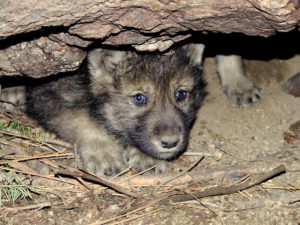
Thanks to intervention by the Western Watersheds Project, the Xerces Society and others, the Bureau of Land Management announced their decision to halt a federal proposal to spray the pesticide carbaryl on 25,000 acres of public land to kill native grasshoppers in Rio Arriba County, New Mexico. Carbaryl not only kills the grasshoppers it targets, it can also poison native bees, butterflies, birds, fishes, aquatic insects, and mammals. This decision to stop the spraying came shortly after Western Watersheds Project and other groups contacted the Bureau to let them know the USDA Animal Plant Health Inspection Service (APHIS), the agency in charge of the project, was likely violating federal law – specifically the National Environmental Policy Act.
The use of chemical poisons to eliminate native species to increase forage for cattle and sheep, has no place on our public lands!
Working with our partners in New Mexico, including the Xerces Society who took the lead in drafting extensive comments pushing back on pesticide spraying in New Mexico, we submitted comments back in April 2023 pointing out the flaws in APHIS’ plans to kill grasshoppers. The problems we identified included the failure to notify the public about the specific places and times the spraying would occur, the agency’s miscalculation of how much poison they would be spraying, the false claim of an “emergency” when grasshoppers are an ongoing, anticipated, and annual occurrence, and the failure to adequately consider the impacts of pesticide application to pollinators throughout New Mexico. APHIS failed to conduct any analysis of the value of the livestock forage that this grasshopper suppression program was supposedly going to protect. This critical piece of information would help the public better understand the costs ($4-$44 per acre for spraying) versus the perceived “benefits” to the livestock industry, which pays just $1.35 per Animal Unit Month (a cow-calf pair or 5 sheep for a month) for that same forage.
APHIS quietly issued a Finding of No Significant Impact for the spraying on June 8, 2023, but never notified WWP or the other groups that commented. Fortunately, the eagle-eyed staff at Xerces Society found out about the planned spraying in Rio Arriba County on June 15, just days before it was scheduled to begin when they happened to see the contract for spraying on a government website. Xerces Society quickly let the rest of us know about the well-hidden plans. Western Watersheds Project contacted the Bureau of Land Management alerting the agency to the fact that APHIS had failed to notify the public about their plans. We also let the Bureau know that any approval of the spraying would likely be violation the National Environmental Policy Act. At the same time, our partners were also contacting the agency and raising the alarm about the lack of public input and oversight. The Bureau quickly responded, and on June 29th as a result of our actions the project was stopped and will only move forward if and when a full analysis of the impacts are considered in a NEPA process by the Bureau of Land Management.
This comes on the heels of last year’s win in stopping a Forest Service plan to poison native wildflowers in Wyoming’s Big Horn Mountains because they are poisonous to cattle.
Together with the Xerces Society and others, WWP will continue to watchdog APHIS as well as the Bureau of Land Management and Forest Service. We’ll work diligently to stop the widespread poisoning of federally managed lands, and we’ll continue to point out the real problem is the degraded conditions of these lands, largely due to livestock grazing.
Photo by Judy Gallaher, courtesy of Flickr






